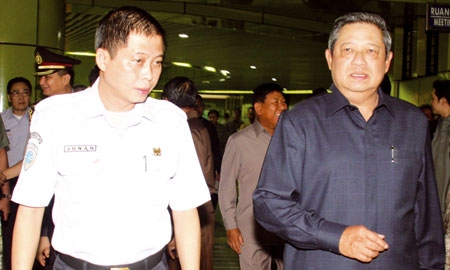Passenger trains in Indonesia are often overcrowded and it’s common to see people clinging to the sides and even traveling on top of carriages. Undoubtedly some of these unconventional passengers are freeloaders, but the shortage of trains and the level of overcrowding are also to blame.
In addition to passengers, the railway system carries cargo – bulk commodities such as petroleum fuel, fertilizer and cement, as well as containers. However, in freight transportation also the trains are straining to meet demand as the economy expands.
Indonesia’s railway system currently comprises four unconnected railway networks, the main one in Java and three others in Sumatra. The average age of the locomotives is 30 years, and lack of maintenance and spare parts affects their reliability.
Overall, a major expansion of the railways is required to reduce pressure on the roads, and to support economic growth and job creation.
“Economic growth may downshift in the near future if we do not improve the system,” says Ignasius Jonan, President Director of
PT KAI, the state-owned railway company. “Logistics costs need to be reduced one way or another.”
Last year, some 21 million tons of goods were transported on the railways. By 2014, this needs to be raised to 35 million tons, rising to 70 million tons by 2018. Capacity for passenger traffic needs to increase from the 200 million passengers who currently travel on the long-distance and commuter lines to 600 million passengers per year by the end of 2018.
There are plans for a $250 million railway link between Jakarta city center and Soekarno-Hatta International Airport, Indonesia’s biggest airport, that there are hopes of completing as early as 2013. A 33-kilometer express line between Manggarai and the airport via Angke in West Jakarta and Pluit in North Jakarta is also planned.
“We are trying to triple the capacity of passengers in the next seven years, we want to make freight grow more than threefold,” says Ignasius Jonan. The railways chief acknowledges that the challenge will be enormous. However, help is being provided by the United States.
In February, a deal to upgrade and maintain the system was signed in Washington by PT KIA and GE Transportation, the leading maker of rail and transportation products. The focus will be on improving Indonesian railway locomotives over the next 40 years, developing the transportation infrastructure, and providing maintenance and technology transfers.
Benyamin Carnadi, the Chargé d’Affaires of the Indonesian Embassy in Washington, hailed the deal as a new landmark in Indonesia-U.S. cooperation in the infrastructure and transportation sectors. U.S. officials said it would provide long-term mutual benefit for both countries and act as a catalyst for increased cooperation between Indonesian and U.S. private sectors.
Last September, the United States Government agreed to a $600,000 grant to support PT KAI’s expansion plan and ensure the safety of the rail network as part of the U.S.-Indonesia Comprehensive Partnership. The grant will provide technical assistance and training of PT KAI staff, and will support the upgrading of the rail signaling and telecommunications systems.

0 COMMENTS